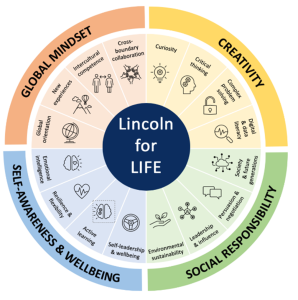Inclusive education at the University of Lincoln centres on voice, partnership, and co-creation, as highlighted in our ‘student as producer’ ethos. The vision outlined in the University of Lincoln’s (2022-2027) Teaching, Learning and Student Experience Strategy states:
“We will co-create meaningful, challenging and life-enhancing educational experiences with our students. We will empower them and support them to become creative graduates with global, inclusive mindsets, a strong sense of personal and social responsibility and the ability to thrive in an ever-changing world”.
The Lincoln for LIFE principles which underlie this vision include:
Learning as one community
Inclusive and diverse
Flexible and agile
Empowered for employment

The ‘Lincoln for LIFE’ core skills wheel highlights the core skills that will be embedded within all the University curricula.
The Inclusive Education Resource Hub will focus directly on the ‘I’ principle, namely inclusion and diversity.
Education at the University of Lincoln will be accessible for all. We will:
- Actively address personal, societal, intercultural, and institutional barriers to realise aspirations.
- Proactively engage with our students and the wider community to facilitate transformative inclusive pedagogies.
- Decolonise our curriculum and our students’ learning experiences.
How we assess our students is central to their development, making a “real-world” approach essential. We will:
- Develop assessments that are inclusive, authentic, transparent, ambitious and co-created with stakeholders.
- Build assessment literacy in staff and students to enable continuous improvement in our practice.
- Enable innovative, multi-modal, holistic, and integrated forms of assessment.
Having these actions and approaches in place ensure a clear and inclusive approach to education permeating all University spaces and communities.
